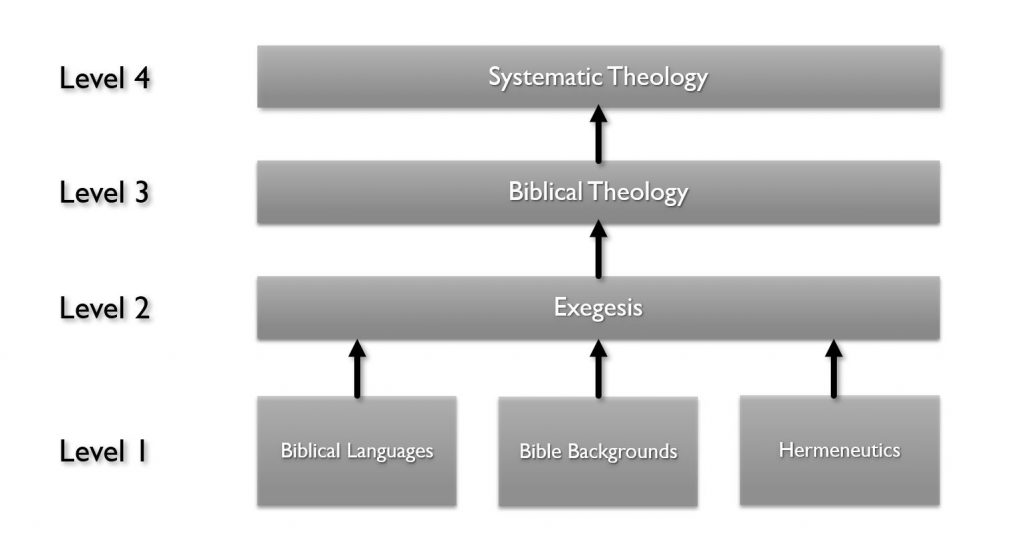A method of ordered thought more suitable toward study, inquiry, and objections concerning Scriptural truth follows the four-tiered model of biblical studies introduced earlier. Whereas biblical languages, bible backgrounds, and hermeneutics together support competent exegesis. Initially, as two levels of effort to understand Scripture in its original, literary, and historical context. From our exegetical efforts, we bring together interconnected text as a biblical theology to further build reasoned conclusions and assertions about what God’s word reveals. Combined texts and concepts demonstrated within Scripture then become assembled to form a systematic theology concerning various doctrines that emerge with a foundational and ordered method of support.

Active use of this model involves matching the right discipline with the questions that arise from concerns in life, or from people that have an interest in a subject area. So questions that become posed often get applied to another area in an approach to respond in a coherent way that fully satisfies questions with answers directly applicable to the matter at hand. In so doing, we maximize the likelihood of interpersonal confidence in the reliability of truth derived from the biblical text, biblical theology, and historical theology as originated from God’s revealed and inspired truth (2 Timothy 3:16).
For people who seek answers or challenge us for specific and reliable reasons for truth, it is not enough to rest upon a platitude that says, “the bible says it, and that settles it.” To borrow on the authority of God’s word in an opaque way doesn’t address the specifics in a detailed and articulate manner. Normally, this effort places our attention upon the level one category of biblical, historical, cultural, and interpretive understanding. While the authority of God’s word is unquestionably true and final, that does not necessarily get to questions of interest and resolve them. It is even better to get a clear understanding of what is otherwise left to confusion, exploitation, or personal economic gain.
As questions, concerns, or objections arise and become addressed, the Biblical Studies model here provides a way to step through each suitable and relevant area that matches our interests. It just isn’t responsive to make an end-run toward conclusions in the realm of systematic theology, or elsewhere. If along the way matching what we understand among biblical languages, biblical backgrounds, hermeneutics, and proper exegetical interpretation, there is a misunderstanding, confusion, or disagreement, then the overall view of the whole Bible comes into view in terms of the doctrine of inerrancy. Until finally, there is acceptance of the truth or willful rejection of God’s word and what it proclaims in terms of authorial intent.
As we match the right subject matter with pertinent questions, we assertively balance advocacy with inquiry to walk through an issue. To build a case in such a way where there is no room for misunderstanding and continued skepticism or Biblical illiteracy. So fluency in Biblical disciplines provides the certainty and confidence necessary for us to articulate the correct responses in areas that come about. Not as through successive approximation across Scripture, but by process of elimination among adjacent disciplines or categories of thought and persuasion. Applying effective use of this model provides a way to quickly get to the root of questions and beneath them to disprove presuppositions and together arrive at correct reasoning and truth.
It is one thing to enlighten people and bring them to recognize the truth. It is quite another that it should be accepted. Either way, we look to a principle as written by the Apostle Paul, “We destroy arguments and every lofty opinion raised against the knowledge of God, and take every thought captive to obey Christ” (2 Cor 10:5). Hopefully and prayerfully, people who are laden by the influence of culture and its darkness, become receptive, take courage, and set aside selfish interests contrary to their well-being.
















Comments are closed.